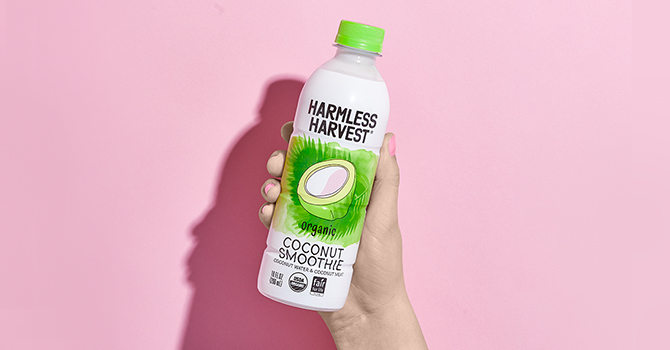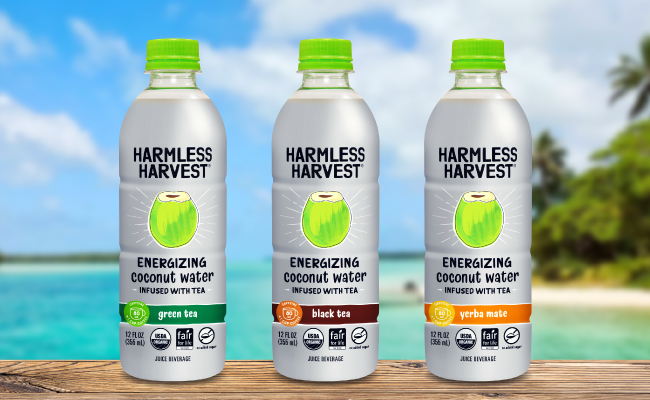
When the return of Zico was announced in January, founder Mark Rampolla left little doubt as to whom he saw in the brand’s crosshairs: Vita Coco. The nascent days of the U.S. coconut water category in the 2000s were colored by the clash between the two brands as they fought to establish the segment as a force in natural hydration, which culminated in Zico’s acquisition by Coca-Cola in 2013.
Yet in the years since, the space has been largely defined by the second wave of brands that followed in Zico and Vita Coco’s wake, including San Francisco-based Harmless Harvest. With the two leaders having firmly established themselves as shelf-stable, mass-market products, Harmless has been steadily expanding its presence on the premium refrigerated side of the category, which continued last month with the launch of a new coconut smoothie drink.
While not exactly a revolutionary innovation — along with coconut water, Harmless currently markets a line of coconut protein smoothies, as well as drinkable non-dairy yogurts — the new coconut smoothie fits with the company’s ethos of simplicity and sustainability, according to CEO Ben Mand. Packaged in 10 oz. PET bottles, the drinks are made from hand-scooped coconut meat that is milled into a fine consistency and blended with coconut water, giving the added benefit of MCTs and fiber. Mand acknowledged that the product was partly motivated by the desire to move the company closer to zero-waste, but also that the nods to hydration and functionality are broader and less specific than in the brand’s protein line.
“You want to be innovative and have fast-paced marketing and innovation, but you also have to be somewhat disciplined in your focus,” he said. “For us, when we look at our raw materials and our capabilities, we feel that the refrigerated plant-based beverage and dairy space is definitely our sweet spot.”
Harmless may not be looking to move out of that space as of yet, but the company is testing the boundaries of what types of products and formats will feed growth for its platform and integrate well into current consumer shopping habits. Some moves have been a direct response to the decline in on-the-go use occasions since the pandemic began: positioning it as an ideal base for making morning smoothies at home, the company introduced in January a 24 oz. multiserve bottle for its drinkable yogurts (available in plain and vanilla flavors) at Whole Foods. Harmless Harvest’s spoonable yogurts also recently made the move into a multiserve package, which Mand said has already eclipsed sales for the single-serving cups.

While those products deepen Harmless Harvest’s presence in the natural retail channel, its next innovation is being positioned to drive e-commerce traffic through its website. Later this year, the brand will release a moderately caffeinated (around 80mg from either black tea, green tea or Yerba mate) coconut water line in three SKUs, initially as an exclusive for its online store. Mand is bullish about its prospects, pointing to strong interest from the brand’s consumer base.
“This was basically at the top of anything we have tested,” he said. “Going back to the theme of simplicity, how do we bring a benefit that consumers are looking for and it’s really novel to brew a tea with coconut water. That’s a very unique proposition that we are playing with that we think has some serious legs.”
Outside of the liquid itself, Harmless has continued to shape its business around responsible sourcing efforts and business practices with its partner farms in Thailand. In December, the company announced the launch of the Regenerative Coconuts Agriculture Project (ReCAP), an initiative aimed at creating an industry model for regenerative coconut farming. ReCAP aims to help train farmers about management, soil health and other agricultural best practices, but also to steer them towards methods that will increase biodiversity and boost resilience through cover crops, intercropping and other organic inputs. The three-year program has the target of increasing farmer income by at least 10% and to transition 50% of their certified acreage to regenerative organic agriculture by 2023, as well as establishing an entity to support a long-term conversion campaign in Thailand.
For Mand, ReCAP is an opportunity to win on three key fronts: raising income for farmers, rebuilding the ecosystem and securing the long-term health of its unique supply chain, one that is particularly susceptible to the threat of climate change. Last year, a severe drought in Thailand had “a profound impact on supply and costs,” he noted.
“When you transition to regenerative agriculture and you have nitrogen-fixing ground cover and cash crops and you approach the farming from a polyculture standpoint with a diverse ecosystem, it becomes much healthier,” Mand said. “The root structure gets much stronger and it’s able to hold the moisture in far better. It doesn’t take much of a leap to understand that the water you get out of a coconut is highly correlated to the amount of moisture in the soil.”